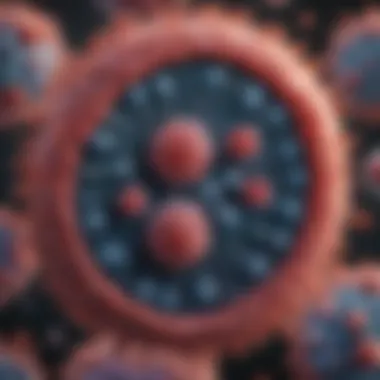Herpes Simplex Virus 1 Antibodies Explained


Overview of Research Topic
Brief Background and Context
Herpes Simplex Virus 1 (HSV-1) is a common virus that primarily causes oral herpes but can also lead to other complications. It is essential for both individuals and the public health landscape to understand HSV-1 and its antibodies. Antibodies are proteins produced by the immune system in response to the presence of pathogens. In the case of HSV-1, the development of antibodies signifies the body's effort to combat an infection. Understanding these antibodies contributes to the broader understanding of immune responses and potential clinical outcomes.
Importance in Current Scientific Landscape
Research on HSV-1 antibodies has gained significant attention in recent years due to increasing prevalence and the virus's impact on public health. Currently, there is a need to understand better how these antibodies function in various populations. Studies indicate that infection rates are rising, necessitating an exploration of HSV-1 antibodies’ roles in diagnostics, treatment protocols, and vaccine development. The detailed analysis of these antibodies provides valuable insights into both infection control and future health policies.
Methodology
Research Design and Approach
The examination of HSV-1 antibodies relies on a mixed-methods approach, which encompasses both qualitative and quantitative data to fully grasp their significance. This includes longitudinal studies to monitor antibody levels over time and cross-sectional analyses to assess the immune responses within different demographics. The integration of clinical data and laboratory results provides a rich tapestry of information that informs current understanding.
Data Collection Techniques
Data on HSV-1 antibodies is gathered through multiple techniques:
- Serologic assays: These tests detect HSV-1 specific antibodies in the bloodstream, indicating either current or past infection.
- Surveys: Patient questionnaires help gather demographic data and symptom reports, contributing to the overall profile of HSV-1 prevalence.
- Clinical studies: Implementing structured clinical trials offers insights into how antibodies correlate with symptoms and remission.
Understanding these elements not only helps in managing existing cases but also shapes public health initiatives and educational programs.
"The role of HSV-1 antibodies goes beyond individual health, impacting societal understanding of infection control and preventive measures."
Delving into the complexities of HSV-1 antibodies offers a pathway to address existing gaps in research and highlights their relevance in today’s health conversations.
Preface to Herpes Simplex Virus
The herpes simplex virus type 1 (HSV-1) is a complex subject that merits in-depth exploration. This section aims to establish foundational knowledge regarding HSV-1, its relevance, and its implications in the field of immunology and public health. Understanding HSV-1 is not only vital for researchers but also for healthcare professionals, educators, and those engaged in public health initiatives.
Overview of HSV-1
HSV-1 primarily affects the oral and facial regions, leading to conditions commonly known as cold sores. This virus is highly contagious and spreads through direct contact with an infected person's saliva or skin. It can establish lifelong latency within the host, which poses challenges for treatment and management.
The virus's ability to go dormant in the sensory ganglia creates a need for continuous monitoring and research. The infection often goes unnoticed in its primary stages, which can complicate understanding its epidemiological impact. Moreover, the molecular structure of the virus allows it to evade the immune response effectively, making its antibodies a crucial area of study.
Epidemiology and Transmission
Epidemiological data showcases that HSV-1 is widespread globally. In fact, a significant portion of the population, especially in developed nations, is exposed to the virus during childhood or adolescence. Transmission primarily occurs through non-sexual means, commonly through kisses or shared utensils. Unbeknownst to many, even asymptomatic individuals can spread the virus, which complicates public health measures.
Factors influencing the transmission rate include age, living conditions, and social behavior. The prevalence of HSV-1 has been increasing in certain demographics, particularly among young adults, which raises concerns about public health strategies. By understanding the dynamics of transmission, healthcare providers can better inform prevention measures and raise awareness about the virus's impact on both individual and community health.
"Understanding the epidemiology of HSV-1 is essential for developing effective public health strategies."
Understanding Antibodies
Antibodies play a crucial role in the immune system, acting as defenders against pathogens like the herpes simplex virus 1 (HSV-1). Understanding antibodies, particularly in the context of HSV-1, provides insights into how the body responds to infection. This section examines the definition and function of antibodies, as well as the different types relevant to HSV-1. These details help in grasping the complexity of immune responses and the implications for diagnosis and treatment.
Definition and Function of Antibodies


Antibodies are proteins produced by B cells in response to antigens, which are substances that the immune system recognizes as foreign. Their primary function is to identify and neutralize pathogens, such as viruses and bacteria. Antibodies bind to antigens, marking them for destruction by other immune cells.
The process begins when a pathogen enters the body. Specialized immune cells detect the presence of an antigen. In response, B cells are activated and start to produce antibodies specific to that antigen. Once these antibodies are present, they not only eliminate the invader but also help form a memory within the immune system, enabling quicker responses to subsequent encounters with the same pathogen.
Types of Antibodies Relevant to HSV-1
There are several types of antibodies produced in response to HSV-1 infection. Two key types are Immunoglobulin M (IgM) and Immunoglobulin G (IgG). Each type serves a specific purpose in the context of the immune response.
IgM
IgM antibodies are typically produced during the initial stages of an infection. They are the first line of defense, appearing shortly after the body detects HSV-1. The key characteristic of IgM is its rapid production; they can be detected in the blood early on, making them a useful marker for recent infections. Because of their early response, IgM antibodies are a beneficial choice for diagnosing acute cases of HSV-1.
One unique feature of IgM antibodies is that they consist of a pentamer structure, meaning five antibody units are joined together. This structure allows for strong binding to antigens, enhancing their neutralizing ability. However, one disadvantage is that IgM antibodies do not stay in the bloodstream long-term, which means their presence indicates an ongoing or recent infection rather than a past one.
IgG
IgG antibodies, in contrast, are produced later in the immune response, typically weeks after the initial infection. They are crucial for long-term immunity against HSV-1. A standout characteristic of IgG is its ability to persist in the bloodstream for many years, sometimes for a lifetime. This makes IgG an invaluable indicator of past infection.
The unique feature of IgG antibodies is their versatility; they can engage with various immune system components. This adaptability is essential for effective immune memory and response upon re-exposure to HSV-1. However, a notable downside is that IgG detection does not provide information about how recent an infection occurred, making it less useful for acute diagnostics compared to IgM.
Understanding the roles of IgM and IgG is essential for effective clinical decision-making in the management of HSV-1.
In summary, the study of antibodies in relation to HSV-1 offers insights into both the diagnosis of active infections and the understanding of an individual’s long-term immunity. This understanding is pivotal for healthcare professionals and researchers in informing treatment strategies and public health policies.
The Immune Response to HSV-1
The immune response to herpes simplex virus 1 (HSV-1) is a crucial area of study within the broader context of infectious diseases. Understanding how the body reacts to HSV-1 provides insights not only into the mechanisms of immunity but also into the nature of the virus itself. The immune system plays a pivotal role in controlling HSV-1 infection, affecting both the individual's health and the potential for transmission within populations. This examination will delve into specific components of the immune response, particularly focusing on the initial immune response and the development of long-term immunity through antibodies.
Initial Immune Response
When HSV-1 enters the body, it often does so through mucosal membranes. The immediate immune response begins when the virus infects epithelial cells. This leads to the activation of immune cells, such as dendritic cells and macrophages, which are essential for detecting and fighting the virus. These cells present viral antigens to T cells, initiating a complex immune cascade. The release of cytokines is also significant. These signaling molecules enhance communication between cells and help recruit additional immune cells to the site of infection. This stage is critical in limiting the spread of the virus and reducing severity of initial symptoms.
Some specific features of the initial immune response include:
- Activation of Natural Killer Cells (NK Cells): These are the first line of defense against viral infections, targeting infected cells directly.
- Production of Interferons: These proteins have antiviral properties and play a vital role in establishing an antiviral state within neighboring cells.
- Inflammatory Response: This response, characterized by redness, swelling, and pain, serves to localize the infection and facilitate the arrival of immune players.
Understanding the dynamics of this initial immune response is fundamental, not only for grasping how the body confronts HSV-1 but also for exploring potential therapeutic strategies that could enhance this response against infections.
Long-Term Immunity and Antibodies
Once the immediate threat from HSV-1 has been managed, the immune system transitions into a maintenance phase. This is where long-term immunity and the formation of antibodies become central. Immunoglobulin G (IgG) and Immunoglobulin M (IgM) are the primary antibodies produced in response to HSV-1 infection. In particular, IgG plays a significant role in long-term immunity. These antibodies can remain in the bloodstream for years, providing ongoing protection against future infections.
The development of long-term immunity often involves the following aspects:
- Memory T Cells: After initial infection, some T cells become memory cells, allowing for a quicker and more effective response upon re-exposure to the virus.
- Antibody Persistence: The presence of IgG antibodies indicates past infection and contributes to a degree of immunity, even if it may not prevent reactivation of the virus.
- Balance of Immune Response: A healthy immune system maintains a balance between activation and regulation, preventing overreaction that could lead to tissue damage while ensuring effective viral control.
Long-term immune memory is essential not only for managing HSV-1 infections but also for potential vaccine development. A deeper understanding can lead to improved strategies in preventing and treating HSV-1, especially for populations at higher risk.
"The body’s ability to remember past infections is one of its most sophisticated defenses against recurring pathogens."
As we move forward in this article, we will explore the methodologies for testing HSV-1 antibodies and their implications for clinical practice and public health.
Testing and Detection of HSV-1 Antibodies


The topic of testing and detection of HSV-1 antibodies plays a crucial role in understanding the body's immune response and diagnosing herpes simplex virus infections. Understanding which testing methods are effective can enhance treatment approaches and improve patient outcomes. Antibody testing offers insights into whether an individual has been exposed to the virus, guiding both personal health decisions and public health strategies. Careful consideration should be given to the type of test used, as each method has unique characteristics that can influence its effectiveness in clinical settings.
Methods of Antibody Testing
Serological Tests
Serological tests are vital tools that identify the presence of antibodies in the blood. They evaluate the immune response to HSV-1. One key characteristic of these tests is their ability to distinguish between IgM and IgG antibodies. IgM typically indicates recent exposure, while IgG suggests past infection.
This specificity makes serological tests a beneficial option for diagnosing HSV-1. They can be performed relatively easily and provide results in a short period, often within hours to a couple of days. A unique feature of serological tests is their broad availability; they can be conducted in various healthcare settings.
However, there are disadvantages. False positives and false negatives can occur, leading to misinterpretation of a person's infection status. This can cause unnecessary anxiety or incorrect treatment decisions.
PCR Testing
PCR testing, or polymerase chain reaction testing, is another method used to detect HSV-1. This test focuses on identifying the genetic material of the virus rather than antibodies. A key characteristic is its high sensitivity and specificity, which makes it a powerful option in diagnosing active infections.
PCR testing is beneficial because it can detect the virus earlier than serological methods, making it crucial for acute cases. A unique feature is its exceptional accuracy, often considered the gold standard for viral detection in clinical settings.
However, PCR testing has its limitations. It typically requires more specialized lab equipment and may take longer to process compared to serological tests. Additionally, accessibility may be a concern in some healthcare institutions.
Interpreting Test Results
Understanding how to read and interpret test results is crucial for managing HSV-1 infections. Antibody testing results can provide immediate understanding of a person's immunity status. Generally, positive IgG results indicate a previous infection, while negative results often mean no exposure. IgM presence, on the other hand, is interpreted cautiously since it can indicate recent infections but may not be present in all cases.
"The proper interpretation of HSV-1 antibody test results plays a significant role in clinical decision-making and future health strategies."
In summary, proper testing and detection methods for HSV-1 antibodies not only aid in diagnosis but also have implications for treatment and prevention strategies. Knowledge of the limitations and advantages of each testing method is essential for healthcare professionals and patients alike.
Clinical Implications of HSV-1 Antibodies
The clinical implications of herpes simplex virus 1 (HSV-1) antibodies are significant, affecting diagnosis, treatment, and the overall management of patients. These antibodies serve as indicators of past exposure and active infection, providing valuable insights into the patient's immune status. Understanding their role enables healthcare professionals to make informed decisions and improve patient outcomes. Here are the key areas of focus regarding HSV-1 antibodies in clinical practice.
Role in Diagnosis
Diagnosing HSV-1 infection primarily relies on the detection of specific antibodies in the blood. Serological testing can identify IgM and IgG antibodies. IgM antibodies suggest a recent infection, while IgG antibodies indicate past infection. This distinction is crucial for appropriate clinical management.
- Accuracy and Reliability: Serological tests vary in their sensitivity and specificity. Ensuring accuracy in tests is essential to avoid misdiagnosis, which can lead to inappropriate treatment.
- Symptom Correlation: Patients presenting with symptoms such as oral or facial lesions may benefit from antibody tests. Positive IgG results can confirm a past infection, providing clarity in recurrent cases.
- Epidemiological Insights: Understanding the prevalence of HSV-1 antibodies in different populations aids in tracking outbreaks and adjusting public health responses accordingly.
Impact on Treatment Strategies
HSV-1 antibodies play a pivotal role in shaping treatment strategies, especially in managing active infections and guiding preventive measures:
- Antiviral Therapy: The presence of HSV-1 antibodies may inform the need for antiviral medications in cases of active infection. Treatment often aims to reduce the severity and duration of symptoms.
- Prophylactic Measures: For immunocompromised individuals or those with recurrent infections, knowledge of antibody presence allows for tailored prophylactic strategies, reducing the risk of severe outbreaks.
- Patient Education: Educating patients on their antibody status equips them with information about their infection. This can lead to better adherence to treatment plans and behavioral adjustments to minimize transmission risks.
Understanding HSV-1 antibodies is essential for clinicians in the evaluation and management of herpes simplex virus infections.
Recent Research Developments
Recent research developments in the field of Herpes Simplex Virus 1 (HSV-1) antibodies hold significant importance for both clinical practices and public health strategies. As the understanding of immune responses improves, researchers focus on innovative approaches to antibody testing and the implications of their findings. This section delves into key aspects of recent research, highlighting benefits and considerations that are crucial for practitioners and researchers alike.
Innovations in Antibody Testing


Advancements in technology have led to notable innovations in antibody testing for HSV-1. Traditional serological methods, while effective, often present challenges in specificity and sensitivity. Recent innovations aim to address these limitations.
Newer platforms, such as enzyme-linked immunosorbent assays (ELISA) and rapid point-of-care tests, are making significant strides. These methods can deliver quicker results compared to older techniques, enhancing the timeliness of diagnosis. The integration of high-throughput screening technologies also allows for the simultaneous analysis of multiple samples, improving laboratory efficiency.
Another promising approach is the application of next-generation sequencing. This method can offer comprehensive insights beyond just the presence of antibodies, potentially identifying different strains of HSV-1. Reliable data on strain variation may inform treatment choices, leading to more personalized interventions.
Implications of New Findings
The implications of new findings on HSV-1 antibodies are vast and multifaceted. Studies have shown that the presence of specific antibody types can correlate with varying disease outcomes. For instance, high levels of IgG antibodies may indicate a more robust immune response and lower likelihood of recurrent outbreaks.
Moreover, research indicates that understanding the seroprevalence of HSV-1 antibodies can shape public health policies. Awareness of population-level immunity can inform vaccination strategies, especially in high-prevalence areas. The data can guide targeted educational campaigns to help mitigate transmission rates.
"By evaluating the role of antibodies within larger public health frameworks, we can foster a more informed and proactive approach to managing HSV-1."
This understanding aids in developing tailored prevention measures, emphasizing the importance of education and outreach. Public health initiatives can leverage new research to elevate awareness and encourage testing.
Public Health Perspectives
The role of herpes simplex virus 1 (HSV-1) antibodies in public health is significant and multi-faceted. Understanding these antibodies can guide interventions and educational programs aimed at reducing infection rates. The influence of HSV-1 extends beyond the individual, impacting broader public health outcomes. Awareness, education, and preventive strategies can reshape perceptions and behaviors regarding this virus and its associated health risks.
Awareness and Education
Raising awareness about HSV-1 and its antibodies is crucial for public health initiatives. Many people are unaware of HSV-1's prevalence and the asymptomatic nature of some infections. Educational campaigns can address misconceptions about transmission, symptoms, and the importance of antibody testing.
Key points for awareness include:
- Understanding Transmission: Many individuals do not realize that HSV-1 can be spread even when symptoms are absent. Educational efforts should emphasize that saliva can carry the virus and that it’s important to practice safe behaviors.
- Symptoms Recognition: Clear information about the signs of an outbreak can lead to timely medical consultation and better outcomes.
- Promoting Testing: Educating individuals about the significance of antibody testing can lead to earlier detection and better management of the virus. This can help in alleviating the stigma often associated withHSV-1 infections.
Preventive Measures and Vaccination Efforts
The focus on preventive measures and potential vaccine development is vital in managing the spread of HSV-1. Current prevention strategies revolve around education, safe practices, and research into vaccines.
Important preventive measures include:
- Safe Practices: Encouraging the use of barrier methods such as condoms during sexual activity can reduce the risk of transmission. Public health messaging should highlight that while these methods do not eliminate risk completely, they significantly lower it.
- Promotion of Good Hygiene: This includes washing hands after contact with sores or potentially infectious areas, as well as avoiding sharing utensils and personal items.
Research into vaccines, though still ongoing, shows promise. A successful HSV-1 vaccine could potentially change the landscape of public health significantly. This anticipation adds urgency to funding and supporting research initiatives, fostering collaboration between health organizations, universities, and pharmaceutical companies.
"Effective communication on HSV-1 can empower communities to adopt preventive measures and enhance their overall health literacy."
In summary, addressing public health aspects related to HSV-1 antibodies encompasses awareness, education, and preventive strategies. By integrating these elements, health professionals can work towards reducing the impact of the virus in communities.
Closure
The conclusion serves a vital role in encapsulating the discussions and findings regarding herpes simplex virus 1 (HSV-1) antibodies. This section synthesizes the entire article, highlighting the significance of antibodies in understanding HSV-1 infection, the immune response, and the implications for public health.
Summary of Key Points
- Antibody Function: The antibodies, particularly IgM and IgG, are crucial in the body’s defense mechanisms against HSV-1. The immune response's timing and effectiveness vary with these antibodies, providing insights into stages of infection.
- Testing Methods: Different approaches such as serological tests and PCR testing help in accurately detecting HSV-1 antibodies. Understanding these methods is essential for diagnosing infections accurately.
- Public Health: Knowledge and awareness surrounding HSV-1 antibodies significantly impact prevention strategies and health education initiatives. Better awareness can lead to reduced stigma and increased preventive measures.
- Recent Research: Current studies offer new insights into HSV-1 antibodies, paving the way for advancements in diagnostics and treatments.
This summary highlights the key aspects discussed, enabling readers to grasp the essential elements and their implications effectively.
Future Directions in Research
Future research on HSV-1 antibodies is likely to focus on several crucial areas:
- Vaccine Development: Efforts to create effective vaccines targeting HSV-1 are ongoing. Research could lead to novel preventative strategies that utilize antibody responses.
- Longitudinal Studies: More in-depth, long-term studies could elucidate the lasting effects of HSV-1 antibodies and immunity over time.
- Innovative Testing: New technologies to improve the accuracy and accessibility of antibody testing may emerge, enhancing diagnostics in various healthcare settings.
- Understanding Variability: Exploring why antibody responses vary among individuals can lead to personalized treatment approaches.
Future research holds the potential to drastically change how we understand and manage HSV-1, providing exciting avenues for exploration that may impact millions globally.



